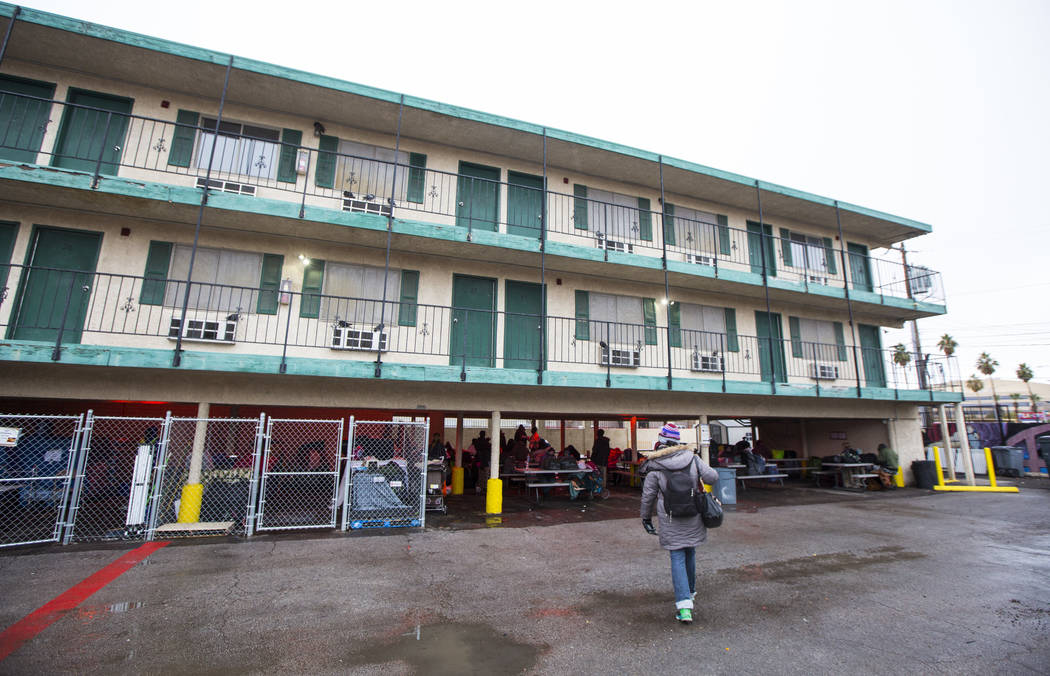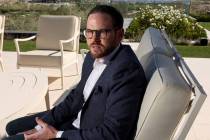Las Vegas Council candidates propose solutions on homelessness
Seven council candidates appear to be in lockstep on major issues in the race to represent downtown and eastern Las Vegas, deviating only in nuance during two days of forums this week.
In the Las Vegas City Council’s Ward 3, voters will choose from office seekers who support cannabis consumption lounges and elimination of minor marijuana offenses as factors in work card denials; light rail transportation for Maryland Parkway; short-term rentals with proper regulations; and commitments to ease access to government services.
On Wednesday and Thursday, they spoke to crowds at town halls hosted by the Stonewall Democratic Club of Southern Nevada and, in the second, by downtown neighborhood associations and Nevadans for the Common Good, a bipartisan federation of faith-based groups.
The first town hall focused largely on platform, the other on commitments. And while candidates addressed several issues at length, perhaps no problem in the urban ward has been more discussed or pervasive than homelessness.
Special education teacher Aaron Bautista said it was imperative to bring more community partners to the table to compensate for a lack of funds, urging increased spending on programs and services and more involvement by the city.
Bautista, 35, has cast his work with HELP of Southern Nevada, the social services nonprofit, as instrumental to tackling the problem.
“I’ve been in a lot of the abandoned buildings here,” he said. “I’ve been under the bridges and the washes.”
Questioning the current approach
But Melissa Clary, a project manager for the U.S. Department of Veterans Affairs, said she has the necessary experience, too, serving for three years on the board of the Southern Nevada Homelessness Continuum of Care.
A vocal critic of the city’s courtyard project, the so-called one-stop shop for homeless services, Clary questioned long-term operational funding and whether Las Vegas wasn’t duplicating adjacent services offered by nonprofits and adding staffing burdens to a lean city budget.
Clary, 37, said private-public partnerships with a housing-first approach are key, underscoring her belief that state legislators need to do more to address what has been “an epidemic for years.”
She vowed to be a “champion” of the issue and engage Clark County for help.
Speaking to the Review-Journal on Friday because he missed the forum where the topic had been addressed, former Rep. Ruben Kihuen said he had pledged to work with Veterans Village and potentially expand its model of refurbishing older buildings into affordable housing.
Beyond reducing the number of people on the streets, Kihuen, 38, pitched the idea as a cost-savings measure, saying that treatment in jails and hospitals is more expensive than investing in solutions. With a thriving city economy, he said, “we can find funding to be able to help our most vulnerable.”
Money an issue
Cash flow promises to be a major factor in the fight, however, and former Las Vegas Planning Commissioner David Lopez, who echoed the call for a housing-first model, said he would consider a sewer fee or other tax to buoy funding.
Former Assemblywoman Olivia Diaz said it would take an effort at every level to meet the needs of a diverse population whose issues run the gamut of mental health, addiction and economic woes. She said, however, that officials must remain fiscally prudent.
Mingo Collaso, owner of a restaurant in the Arts District, suggested that more money could be secured through a blight tax on owners of abandoned buildings, with portions of the collected revenue set aside for homelessness services and afforable housing.
Shawn Mooneyham, a security officer at a hotel and casino who has been homeless before, said he believes in a meeting of the minds of all agencies affected, adding that the courtyard appeared to be a good first step.
The 37-year-old expressed no reservations in holding utility companies accountable for crumbling infrastructure that make ward neighborhoods unsafe. He said he favored expanding the budget for code enforcement if necessary to secure abandoned buildings, highlighting problems at the El Cid Hotel downtown as indicative of a larger problem of irresponsible ownership.
Collaso, 38, is pitching his business investment in the ward as reason for voters to return the favor at the polls, underscoring that pedestrian safety was an important piece to his platform and that he favored revitalization without gentrification.
“We don’t want the face of eastside downtown to change,” he said. “We want to include everyone.”
Diaz, 40, called for balance on issues she supports including marijuana lounges, where she believed licenses shouldn’t be reserved for special interests, and on short-term rentals, which she said should be resolved with a “middle of the road” solution.
As a teacher at Ruby Thomas Elementary School, she disagreed that assisting children who consistently move schools due to parental economic struggles fell outside the council purview.
“I think we need to engage in conversations with the Clark County School District,” she said. “They have the data that shows this about children, so how can we proactively help support one and another.”
Kiuhen, who introduced legislation that led to marijuana dispensary legalization in Nevada, cast his efforts in the state Legislature as a sign that he would be equally progressive on cannabis issues on the council. He was the only candidate not to fully support the light rail option, preferring to wait to fully understand financial and other impacts first.
“More important than talking to people at the door, I’m listening to them,” he said about his campaign. “Right now, this district has not gotten the attention it deserves. We need someone with federal, state and local experience” to tackle homelessness, public safety and infrastructure issues.
Everyone has experience,” Lopez said, 26, said citing a City Hall background. “I think it matters what experience and where your experience comes from.”
Lopez is banking on a pledged accessibility and 10 years of public service at City Hall, including seven as a planning commissioner, and roles as staff intern for former Mayor Oscar Goodman and board member on Youth Neighborhood Association Partnership Program, which offers grants to youth and neighborhood-oriented service projects.
Clary, who spent several years advocating for the Huntridge neighborhood and managed capital improvements for parks and more in the city for a half-decade, said she will continue work on the dais to preserve arts and culture including the Historic Huntridge Theater.
Additionally, she desribed herself as a “fan” of the light rail because of the transit-oriented development that would follow.
“I’ve gone to bat for a number of issues that haven’t been popular and that people didn’t necessarily speak out on,” she said.
Bautista also named arts and culture development as priorities and he underscored his efforts as a teacher to work with struggling families, including new immigrants, as evidence he could band together a community.
Contact Shea Johnson at sjohnson@reviewjournal.com or 702-383-0272. Follow @Shea_LVRJ on Twitter.
The primary election is April 2. View more information about candidates here.























